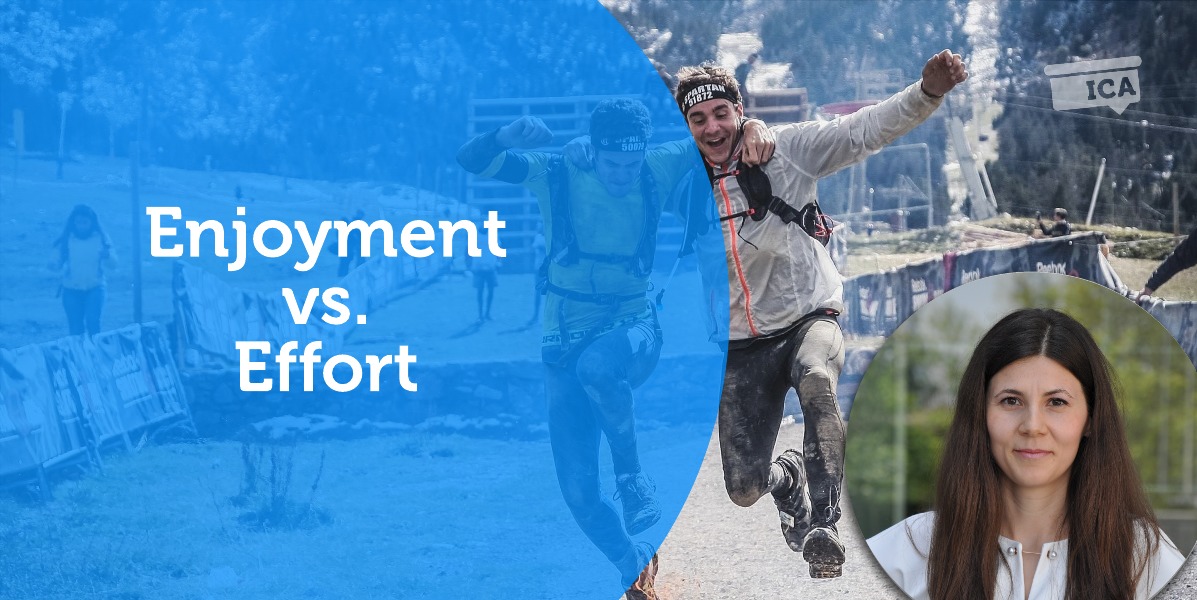A Coaching Power Tool Created by Georgiana Puica
(Life Coach, ROMANIA)

Always make your enjoyment greater than your effort (Laws of lifetime growth)
An Effort is defined as per the Cambridge dictionary as the physical or mental activity needed to achieve something.
High perceived effort is a major impediment of behavior change, from the adoption of an exercise routine to changing one’s diet, etc.
Some thoughts:
Recognizing how we look at the events and actions in our lives is a first step towards changing the amount of effort seen to enjoyment.
Enjoyment– as per the dictionary definition it refers to happiness, satisfaction, pleasure, delight, etc.
Historically “happiness” had several meanings, mainly summarized as below:
What happens when you enjoy what you do? You do not feel the effort or the same level of effort.
The “enjoyment” is described in more detail in my research paper.
Self-application
Which are the conditions of enjoyment? We should try to identify conditions that favor a positive appreciation of life.
Most of the things at my job are already not interesting. There are plenty of things that I have to do even though I don’t want to do them, and I found them useless. The question is if I am still choosing to do this, I am going to look at the effort or will I look at the part that I can still enjoy?
Can you distinguish between the people who enjoy what they are doing from those who see it as a continuous effort? How can I tell, it is the emotion on their face, is it in their voice or the chosen words?
Our attitude at work can make an unpleasant work experience for our co-workers too. But maybe the worst part is how our thoughts affect us.
Another perspective would be that if you are going to do something, do it with a positive attitude and find a way to enjoy it. If needed to do something, then why not do it with a positive attitude? So why see the effort?
Below are listed some ways to look at things and situations to help us see less effort and more enjoyment:
In conclusion, if you are going to do something, find a way to enjoy doing it. Whether it’s your full-time job or something else, don’t allow yourself to have a negative attitude. Remind yourself that you are in control and the choice you make affects you and everyone around you.
Enjoying ourselves, as most of us know from experience, is not as that effortless as you sounds. To live the lives in which we can freely enjoy each moment requires lots of work and self-development.
Coaching application
When you have a goal, enjoying the path rather than the end destination takes away part of the effort.
Many types of research show that external factors, be it happy or sad events in your life, are not key to personal happiness, therefore we should focus more on the internal factors.
The positive difference does not come from so much from what happens but from the way we choose to look at things and respond to them.
We can diminish the level of the perceived effort by focusing more on what makes the ride more enjoyable.
Create a shift in perspective
During a coaching process, the shifting focus from the effort to enjoyment can be done by increasing awareness on the strengths that the client can use in reaching the goal (a tool to identify the client’s strengths can be StrenghtsFinder 2.0). Some key questions could be:
“What is the most enjoyable aspect of this action?”
“What would make the action flow?”
“In what way is the current situation perfect to you?”
“What do you value in this situation?”
Address underlying beliefs
Nothing in the world is worth having or worth doing unless it means effort, pain, difficulty… I have never in my life envied a human being who led an easy life. I have envied a great many people who led difficult lives and led them well.― Theodore Roosevelt
It is worth trying to focus on the underlying believes that support the client instead of the ones that do not serve the client.
Some of the questions that can be used to focus more on enjoyment are:
Reflection
References
ICA modules on Power Tool ( Trust vs Doubt)
Six Degrees of Social Influence: Science, Application, and the Psychology of Robert Cialdini
Edited by Douglas T. Kenrick, Noah J. Goldstein, Sanford L. Braver
Evidence-based coaching handbook: putting best practices to work for your clients; authors: Dianne R. Stober, Anthony Grant; 2006
